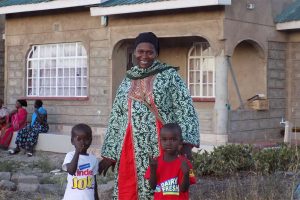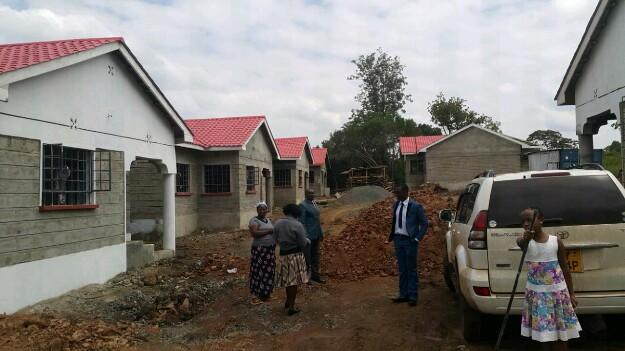Cheap ways to own a house in Kenya: BY DELFHIN MUGO: For 26 years Rose Odinga had lived in Makina village, one of the nine that make up the Kibera slum. Ms Odinga, who was widowed in 1999, has a kiosk at Toi Market, where she sells toys. With two children to feed and educate, never in her wildest dreams had she imagined that she would one day have a decent roof over her head, let alone live outside the slum. However, in 2011 things started changing for the better.
Rose, then 26, and some of her women friends had formed a chama from which members borrowed to boost their small businesses.
Then, by a stroke of luck three members of the chama met a man who sold them the idea of transforming their outfit into a cooperative society, which would enable them to own houses outside the slum.
Excited by the idea, the members shared the news with their colleagues, who were very receptive. Three meetings later, Razak Housing Cooperative Society (known simply as Razak) was born and registered in March 2011. They later joined the National Housing Cooperative Union (Nachu), the umbrella body for housing cooperatives that focuses on rural and urban low-income areas with the aim of addressing poverty through housing by providing training, technical, and nancial services as well as provision of cheap ways to own a house in Kenya.
“When we met as a group with the man who brought up the idea, the members immediately decided to elect officials. I was elected the chairlady. Then we asked him to take us to the Nachu offices. That’s how our journey began,” says Ms Odinga.
Already, 124 members of Razak are the proud owners of one-bedroom houses in Ruai, off Kangundo Road on the outskirts of Nairobi.
Theirs is a story of determination and extra-ordinary zeal to succeed that shows that there are cheap ways to own a house in Kenya.

Take for instance, Nafisa Burhan, who has been the treasurer of Razak since its inception. The mother of five provides for her family by making chapatis and mandazis, which she supplies to offices in the city early in the morning. But she can do this only on weekdays since most offices are closed on weekends and public holidays.
“I also make pilau and get invited to cook at weddings and other functions occasionally. I consider my job some kind of outside catering,” says Ms Burhan, bursting into peals of laughter.
Though she doesn’t earn much—between Sh20,000 and Sh30,000 a month,—Ms Burhan is happy to have been able to save and contribute towards her dream house.
“We met every two weeks and each member would bring Sh2,000. I would collect all the money and deposit it with Nachu,” she offers.
“Remember, by the time we were joining Nachu, we had Sh800,000 in our chama account. We transferred the whole amount to their account so that members could continue topping up their accounts. When every member had saved Sh70,000, Nachu bought a piece of land and started building houses for us,” adds Ms Odinga.
In the meantime, Razak was recruiting more members; by 2013, it had 72 active members. Members who had contributed Sh140,000 got keys to their houses the same year. Among them were Ms Odinga and Ms Burhan.
“The houses were built on a 40x80ft parcel of land in a gated community with a sewer system, electricity and water supply. The houses are designed to have three bedrooms but to make them affordable to us, the organisation first built a bed-room houses so you have a living room, bedroom, bathroom and kitchen. However, they left space for members to complete the construction at their own pace. In fact, if you look at the houses from outside, you will see some bricks protruding, indicating that they will be extended,” says Ms Odinga.
Cheap ways to own a house in Kenya
Nachu’s financial manager, Mr Stanley Kamau, says the women got a Sh525,000 loan each, which covers the cost of the land and the house. After getting the house keys, they were required to settle this in Sh10,500 monthly instalments (including interest) over five years. After deducting the loan application fee, mortgage insurance fee and a 5 per cent cash collateral to be left in every member’s account, the rest of the money would go towards paying for the house.
In 2015, another 36 members received the keys to their houses, with another b36 expected to get their keys in August this year.
Among those who received their keys this year is 54-year-old Asiya Mohammed, who sells vegetables in Kibera. She has three children but also takes care of her late sister’s four children. She told that it though they were able to find cheap ways to own a house in Kenya, it has not been an easy journey.
“It is a miracle that I managed to do this. I don’t make much from my small business. Sometimes we live from hand to mouth but in a good month I can put aside Sh5000, which is the money that has brought me this far. I started off with the first group in 2011 but could not get a house because I did not manage to reach the target. It has taken me seven years,” she says.
Ms Mohammed’s one-bedroom house is in Kamulu Phase 4, off Kangundo Road. She is planning to relocate part of her family to the new house.
“Unlike in the slums, Ruai is more secure. You see, in the slum you don’t know the person next door and there are no demarcations. So you live in constant fear of your daughters getting assaulted when you’re away. Also, here [in Kibera], you find that the toilet and the bathroom are shared, and some people are not willing to keep them clean,” chips in Ms Burhan.
“In order to complete the construction, Ms. Burhan took a Sh. 200,000 loan from Nachu. Thereafter, she sold two plots she had bought in Syokimau for Sh. 30,000 each in 2000, earning her Sh. 1 million shillings. She used the money to finish her three-bedroom house before moving her children there.”
Currently, 55 members of Razak are on the waiting list, but there is a problem.
“The prices of land and construction materials have gone up, so the houses we bought for Sh525,000 about seven years ago are now going for Sh1.2million,” says Ms Burhan.
So, although these 55 members have saved about Sh. 200,000, the monthly repayments of Sh. 17,500 they are expected to make for the loan is too high.
“We are looking to increase the construction period for the project to around two years so that by the time they start servicing the loan, they will have contributed enough money to reduce the monthly installment,” says Mr Kamau.
This story was first published in the Daily Nation. The Daily Nation is a product of Nation Media Group.
Copyright @Nationmediagroup









Does this still exist? I love it and would like to join
How can I buy these bags.
Interested
INTERESTED IN THIS
Am interested in this too